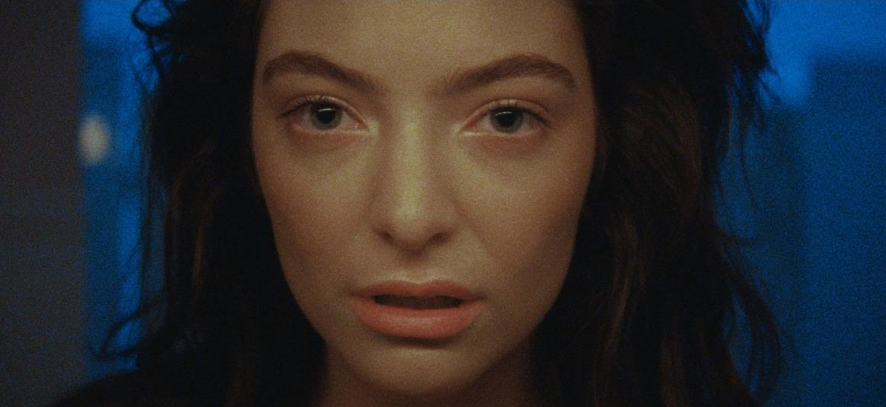In her “Royals” video released in spring of 2013, Lorde sat perched in a white room, brows arched with her body leaning in as if to tell us a secret. With a faux gold necklace draped across her neck and her glance cast downward, the artist’s curly mane and cat-eye makeup gave off the impression of aristocratic power and control—as if the then-sixteen-year-old were already an assured star.
The music video for Lorde’s newest heartbreak anthem, “Green Light,” shows that something has changed. In allusion to the stately portraiture of “Royals,” the piece opens on her face. At age twenty, she has straightened her hair, but left it frizzled. She’s wearing a simple pink dress, her eyebrows raised, make-up absent. She sways a bit, readjusts. We learn that she is, of course, looking at herself in the mirror. Lorde doesn’t have a secret this time; she’s trying to find an answer.
In the last minute of the video, she flails her arms about, taking a moment to dance dramatically on top of her taxi. “I’ll grab my things” she declares, intent on owning her break-up, actively seeking to reclaim pieces of herself from her ex’s home. But as she repeats the next phrase “but I can’t let go,” her voice quivers more and more on that last word—she’s not so sure. That one word holds the promise of release, but it’s also one associated with moving on, a proverbial green light. Firm-handed assistance comes in the way of re-pitched vocals bleating “I’m waiting for it! That green light! I want it!” like eager cheerleaders, a single idea broken into three uplifting gestures. A slithery bass lurches like a drunk taxi ride. This is where we find Lorde in 2017, caught in the middle of heartbreak, waiting for a change to sweep her over, but unable to make it happen herself.
Evacuating dance music of its warmth, “Pure Heroine” showcased electronic wastelands of blips and beeps, upon which the teen’s voice spilled, curled, and refracted into multi-layered harmonies.
In some ways, the change has already come. Lorde’s debut, Pure Heroine, was a musical and lyrical rebellion against pop and its associated culture—a collection of short stories that lampooned excessive wealth and fake smiles, usually in a way you could sing along to. Evacuating dance music of its warmth, the record showcased electronic wastelands of blips and beeps, upon which the teen’s voice spilled, curled, and refracted into multi-layered harmonies. Lorde’s instrument became a vehicle for teenage angst—a magnified whisper occasionally transforming into powerful electronics itself. Debut single, “Royals,” featured lyrics that rebuked the mainstream with a vindictive verse—“every song’s like gold teeth, Grey Goose, trippin’ in the bathroom”—and that snarled chorus: “We’ll never be royals” (with an implied “and we’d rather not”). Lorde’s fresh perspective nabbed two Grammys, a double-platinum-certification for her debut album, and a headlining tour, but the songs never read as bass-thumping pop.
On first listen, “Green Light” comes off as just that. Structurally speaking, the song has all of the makings of a pop anthem. It starts with power chords on the piano, and proceeds to build not once but twice through back-to-back pre-choruses, ratcheting the energy up to a higher notch than necessary. By the time we get to the chorus, we are drowned in a pop chord sequence and a consistent drum pulse. Full-bodied claps replace the subtle snaps of her previous cuts. Only by eschewing an EDM drop does Lorde prevent herself from completely subsuming the building blocks of today’s pop soundscape.
But what makes “Green Light” interesting is not that it takes on tried elements of pop (which it does), but that its songwriting choices actively complicate the feelings of uplift that these electropop expressions are manufactured to create. The effect is emotionally disconcerting; at multiple moments, the artist’s vocals seem to be intentionally chaotic, getting ever so close to breaking free from the song itself.
The backing vocals, so carefully placed on “Royals,” get away from our heroine, picking up the tempo and spraying out between breaths like an ocean wave assault.
One such example lies in the use of the artist’s background vocals, which in “Royals” served to blossom the title lyric into a soothing refrain (and asked us to join in as the royal “we”). “Green Light” uses these small Lorde voices to devastating effect. During the first pre-chorus, we get an accusation of betrayal and a reference to great white sharks. The backing vocals, so carefully placed on “Royals,” get away from our heroine, picking up the tempo and spraying out between breaths like an ocean wave assault: “Hope they bite you / Thought you said that you would always be in love.” This release comes a bit early. After all, we’re still in the development of the song.
The chorus continues the theme of chaos, this time using the singer’s vocal registers to fracture our image of her. “But honey I’ll” lodges itself in Lorde’s raspy low register, and puns on “but on the aisle,” as if jumping forward to a moment when her ex is getting married. “Be seeing you down every road” jumps up to her upper register. Then, that belted title lyric sounds, seemingly constructed from leftover backing vocals. The chorus, the piece of the song which should be easiest to sing along to and most memorable—fragments the singer into three parts. This is a far cry from the simple, up and down nature of the chorus to “Royals.”
Despite pulling from pop music more than usual, “Green Light” exemplifies the clever songwriting we’ve come to expect from the young artist.
The overall effect of the song is jilting—it’s hard to keep both the chorus and pre-chorus on your mind at the same time, given the varying production. It might not bode well for pop radio, but that doesn’t seem to be what Lorde wants. For, despite pulling from pop music more than usual, “Green Light” exemplifies the clever songwriting we’ve come to expect from the young artist. On the second pre-chorus, when the singer claims “I hear sounds in my mind,” ushering in the poppy house piano, we get a reminder of what made this artist famous after all—as the production and lyrics perfectly meld for a brief moment, it looks like she’s in control, an idea confirmed by her credits as songwriter, vocalist, and producer.
Suddenly, the move doesn’t feel like a ploy for chart success, but rather, a performance: the disintegration of self for the viewing public, with just a pinch of melodrama. It’s an attitude that harkens back to a line of a previous Lorde song, in which she dead-panned “in all chaos there is calculation / dropping bottles just to hear them break.” Like that claim, “Green Light” shatters the singer on purpose, but yearns to celebrate in the face of that despair. It is a move by a singer who has complete control of the pop palette, but wishes to experiment nonetheless.
-Shane

